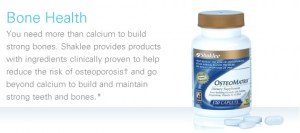Are you laying awake with leg pain?
I was able to answer the question why do I need calcium because certain parts of my body would tell me so when they don’t get enough of it. In the past I have had leg cramps at night and when I take 2 calcium tablets I don’t have cramps. I think that calcium helps with both nerve and muscle health and for me the problem spot was my legs.
I believe in getting plenty of calcium and I know that I can’t get all of it from my food. Another reason why I understand the need for calcium is a condition that I am sure you hear about in the news: osteoporosis. More than 10 million Americans have it and 200 million people worldwide.
Osteoporosis is a serious disease and can be devastating to the person who has it and to family members, loved ones or caregivers who are involved. Strong bones are essential your whole life long. Here’s what Dr. Jaime McManus, Chairman of Medical Affairs at Shaklee says:
“…osteoporosis itself is not the primary problem; the real harm comes from broken bones. It has been estimated that women over 50 years old have a 50% chance of fracture some time in their lives because of osteoporosis. Even men are not immune; they have a 25% chance of fracture. That accounts for over 5,000 bone breaks every day, or two million breaks a year because of osteoporosis in the United States.
Broken bones lead to broken lives. Elderly who suffer fractures have less mobility, less independence, may become bedridden, experience depression, and may even shorten your life.”

You may require a different amount of calcium than I do. You may get more calcium in your diet than I do. For most people it is hard to get enough in your food and calcium supplements are among the most popular supplements that people take.
Why Do I Need Calcium
There has been discussion in the news about research studies raising the question of whether taking calcium supplements is associated with an increase of having a heart attack. Dr. Jamie has commented on this as well so that we can understand and make informed decisions.
” …you can imagine my concern when two recent studies suggested that taking calcium supplements might be associated with an increase risk of heart attack. Our need for adequate calcium is obvious, but if taking it could hurt our hearts, is it worth it?
I was happy to learn that a panel of academic and industry experts convened to see if they could clear up this question. The panel included experts in the fields of cardiology, nutrition, bone health, and epidemiology.
The panel collected and examined the available body of scientific literature, including randomized controlled trials (RCTs) on calcium supplementation and the relationship to heart health.
Here is what panelist Dr. Robert Heaney, MD of Creighton University School of Medicine had to say after their review:
‘There is a strong body of evidence from a variety of rigorous scientific studies reinforcing the benefits of calcium in promoting bone growth and maintenance.
After reviewing the entire scope of scientific literature for calcium, we are now more confident than ever in both its health benefits and safety.’
The panel of experts has confirmed what I have been suggesting for a long time: most adults need around 1,000 milligrams of calcium in their diet daily (more if they are pregnant, lactating, or more than 50 years old).
In my opinion you can continue to take your calcium supplements with the confidence that you are doing the best thing for your body and bones.”
Almost every day in the health area of our news and media outlets we hear about some kind of study and the results that were released. One thing that I have learned is that you have to dig deeper. Doing research is what helps you answer questions such as ‘Why do I need calcium.’
There are so many variables to these studies, specifically about supplements. Some are conducted with very small groups or the time length of the study may be short. I have seen study results that question the benefits of supplements when the participants in the study were already very sick and even though the supplements may impact the illness, they aren’t meant to cure it, and so they get a negative review.
Sometimes I feel like a broken record when I say two things over and over (and over) again: 1) You have to take charge of your own good health, and, 2) You must do your research and demand answers from your brand.
The last part of our discussion of Why Do I Need Calcium today is quality and efficacy. The reality is that food supplements are not regulated like pharmaceutical products. There is a wide variance in quality. There is a wide variance in science and research. There is a wide variance in delivery systems and the ability to absorb nutrients. And there is a wide variance in the results that you get.
One of the very first stories I heard about the difference of vitamin and mineral brands was in regard to calcium. You see, calcium is a bulky ingredient – it’s why the supplement tablets can be so large. Or else, you have to take 4 per day to get the daily serving size – especially if you want to keep the tablets easier to swallow. The story I heard was how supplements can pass through your body and be excreted in whole form – never breaking down and so of course never getting absorbed to provide your body (your cells) with the nutrition.
If you take a supplement for better health, you want to get those results. When you choose a brand that can prove their products work, and that you get the actual benefits from, you are in charge of your good health.
Listen to your body: it may answer the question: Why Do I Need Calcium – because you have leg cramps, some other symptom, or need to build bone strength; or you may want to target prevention of a disease like osteoporosis.



